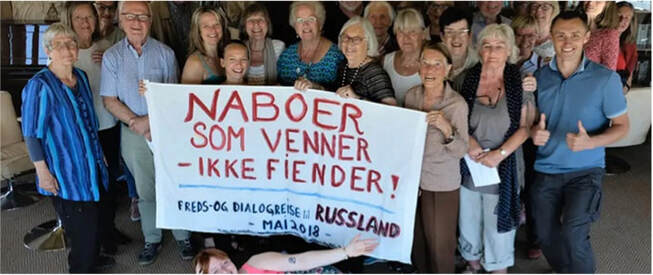Hands Across Borders as a Path
|
To download a pdf of this article, click here.
|

by Ingeborg Breines
This is excerpted from Ingeborg Breines introductory comments at the Neighbors as Friends Not Enemies Nordic-Russian seminar, held at the Peace Research Institute in Oslo. February 3-4, 2020.
Russia is presented as a threat both in the media and in mainstream political rhetoric. Enemy images are created and leaders are demonized. It creates suspicion and fear. Why are these enemy images created, and by whom? Who benefits?
The US and NATO are far stronger than Russia both economically and militarily. The US military expenditure is more than 10 times that of Russia. There are no longer any major ideological differences. Why would the West need to behave so negatively towards Russia? The only plausible answer is the exceptionally strong role of the military industry and the “security machinery”. Without a dangerous enemy, people would not accept such enormous sums on military build-ups. If there are no enemies, there will be no military confrontations, and no need to have a military industry.
In May 2018, persons from different Nordic countries undertook a cultural and peace journey to Russia under the heading, Neighbors as Friends, Not Enemies. We met with academics, peace activists, artists and journalists. We were told how pleased they were that we came, ”with open and friendly faces.” They expressed sadness because of the isolation from friends and potential friends in the West. They feared that the Nordic peace movement was dead — somewhat similar to what we had feared about the Russian peace movement. They offered song and music, food and food for thought and we were overwhelmed by the warm reception. (See the sidebar Statement they issued.)
As a follow up to our trip, we organized a Nordic-Russian civil society seminar at the Peace Research Institute. Participants had open discussions on how to promote peace, disarmament and a sound environment, and agreed to seek ways to continue practical and strategic forward-looking initiatives and solution-oriented dialogues. Different alternatives were discussed as to how we can contribute to changing attitudes on both sides in order to reverse the nuclear and space-arms race, reduce defense spending and get us out of the dominant growth oriented, militarized, confrontational and competitive patterns, and build common security, human security, and a culture of peace and non-violence. And it was considered most vital to build trust between peoples, so essential for real cooperation and peace.
Ingeborg Breines is a World Summit of Nobel Peace Laureates senior advisor, served as director of the Women and a Culture of Peace Programme of UNESCO and was President of the International Peace Bureau.
Image: Peace Ed Campaign
This is excerpted from Ingeborg Breines introductory comments at the Neighbors as Friends Not Enemies Nordic-Russian seminar, held at the Peace Research Institute in Oslo. February 3-4, 2020.
Russia is presented as a threat both in the media and in mainstream political rhetoric. Enemy images are created and leaders are demonized. It creates suspicion and fear. Why are these enemy images created, and by whom? Who benefits?
The US and NATO are far stronger than Russia both economically and militarily. The US military expenditure is more than 10 times that of Russia. There are no longer any major ideological differences. Why would the West need to behave so negatively towards Russia? The only plausible answer is the exceptionally strong role of the military industry and the “security machinery”. Without a dangerous enemy, people would not accept such enormous sums on military build-ups. If there are no enemies, there will be no military confrontations, and no need to have a military industry.
In May 2018, persons from different Nordic countries undertook a cultural and peace journey to Russia under the heading, Neighbors as Friends, Not Enemies. We met with academics, peace activists, artists and journalists. We were told how pleased they were that we came, ”with open and friendly faces.” They expressed sadness because of the isolation from friends and potential friends in the West. They feared that the Nordic peace movement was dead — somewhat similar to what we had feared about the Russian peace movement. They offered song and music, food and food for thought and we were overwhelmed by the warm reception. (See the sidebar Statement they issued.)
As a follow up to our trip, we organized a Nordic-Russian civil society seminar at the Peace Research Institute. Participants had open discussions on how to promote peace, disarmament and a sound environment, and agreed to seek ways to continue practical and strategic forward-looking initiatives and solution-oriented dialogues. Different alternatives were discussed as to how we can contribute to changing attitudes on both sides in order to reverse the nuclear and space-arms race, reduce defense spending and get us out of the dominant growth oriented, militarized, confrontational and competitive patterns, and build common security, human security, and a culture of peace and non-violence. And it was considered most vital to build trust between peoples, so essential for real cooperation and peace.
Ingeborg Breines is a World Summit of Nobel Peace Laureates senior advisor, served as director of the Women and a Culture of Peace Programme of UNESCO and was President of the International Peace Bureau.
Image: Peace Ed Campaign
Cooperation Initiatives |
Statement by Neighbors as Friends |
|
Read more at the Global Campaign for Peace Education website, here. |

